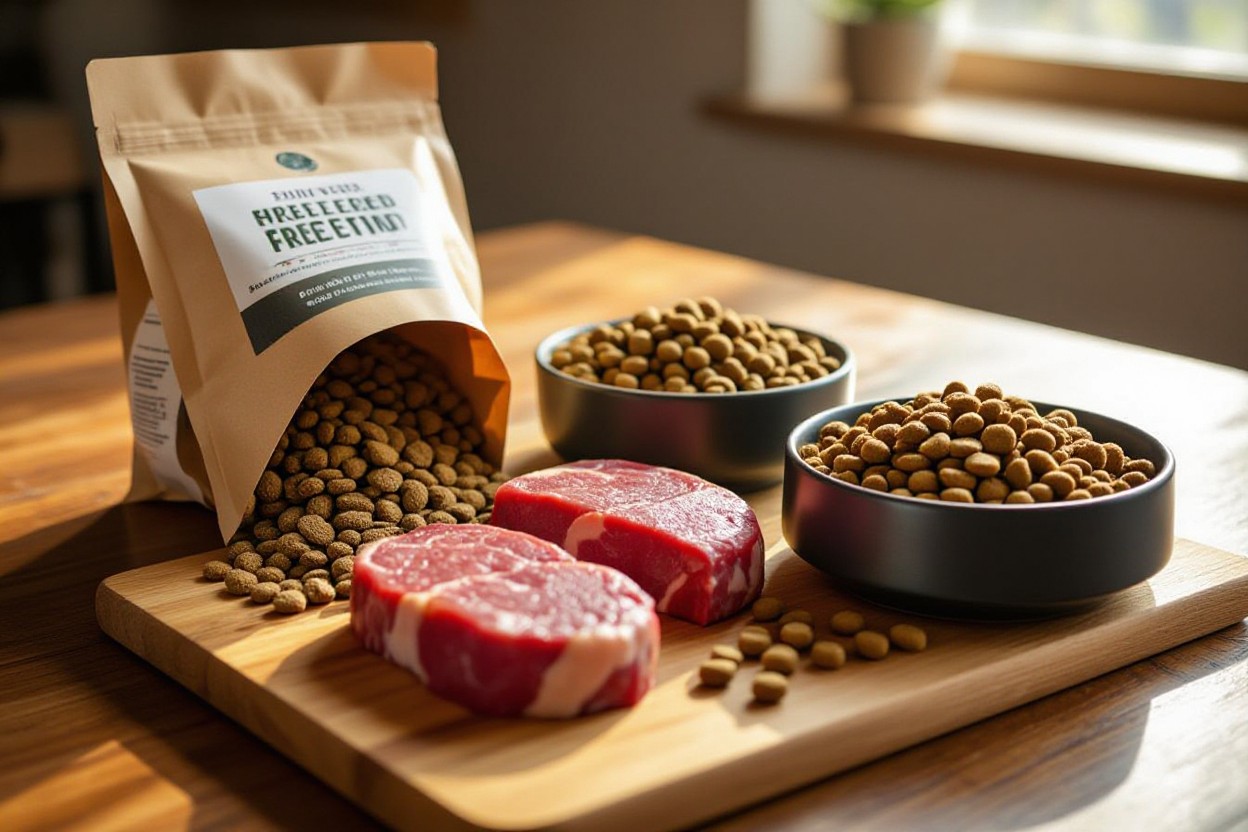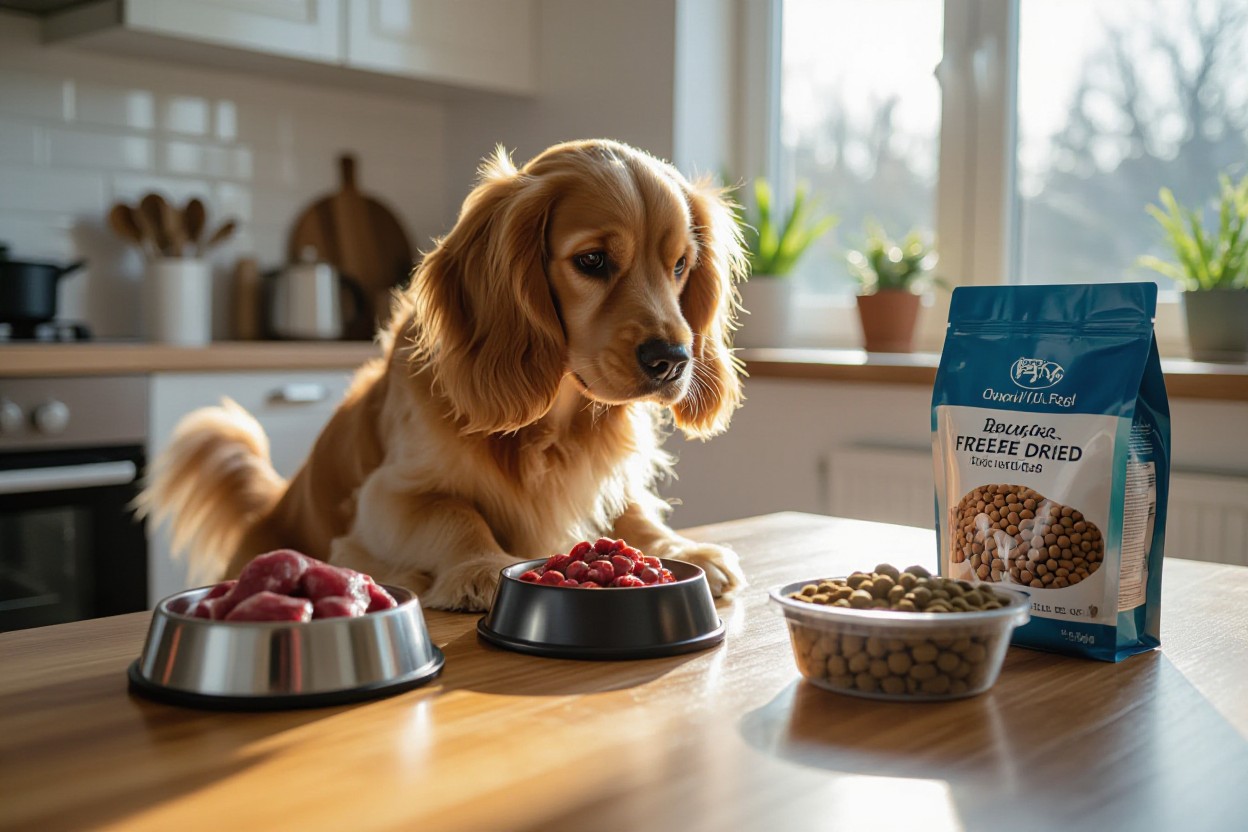With so many dog food options available, choosing the right diet for your Cocker Spaniel can feel overwhelming. You want to provide the best nutrition that supports their unique health needs, from skin to ear care. In this guide, you’ll learn the benefits and considerations of freeze-dried, raw, and kibble diets to help you make an informed decision that keeps your furry friend happy and healthy.
The Nutritional Breakdown: What Cocker Spaniels Truly Require
Cocker Spaniels thrive on balanced diets rich in high-quality protein, healthy fats, and imperative vitamins. Their moderate energy levels mean they need nutrient-dense foods that support muscle maintenance without excess calories. Including omega-3 fatty acids helps reduce inflammation, while antioxidants promote immune health. Moderation in carbohydrates supports steady energy without causing unnecessary weight gain, a common issue in the breed. Whether you choose freeze-dried, raw, or kibble, understanding your dog’s specific nutrient needs ensures you select the best option for lasting health.
Key Nutrients for Optimal Health
Protein from sources like chicken, turkey, or fish forms the backbone of your Cocker Spaniel’s diet, supporting lean muscle and repair. Omega-3 and omega-6 fatty acids ease common skin issues and improve coat shine. Fiber from vegetables aids digestion, while vitamins E and C bolster immune defenses. Glucosamine and chondroitin support joint health, important for this breed’s susceptibility to hip problems. A well-rounded mix of these nutrients promotes energy balance and minimizes health risks unique to Cocker Spaniels.
Special Considerations for Cocker Spaniels
Tending to food sensitivities matters for many Cocker Spaniels, as this breed frequently experiences allergies and ear infections. Selecting hypoallergenic or limited-ingredient diets can reduce flare-ups. Low-glycemic carbs like sweet potatoes help regulate blood sugar and weight, vital given their predisposition to obesity. Foods enriched with zinc and vitamin A support skin health and reduce itchiness, while probiotics assist in preventing digestive upset linked to their sensitive stomachs.
Many Cocker Spaniels benefit from diets that proactively address their hereditary concerns. For instance, incorporating supplements like omega-3s from fish oil can lower chronic ear inflammation, helping to prevent infections. Avoiding common allergens such as wheat, soy, or corn often leads to noticeable improvements in coat quality and itchiness. You might also consider freeze-dried or raw diets because their limited processing preserves nutrients that enhance overall vitality. Consulting your vet for tailored advice based on your dog’s unique health history often yields the best dietary plan.
Freeze-Dried Food: A Convenient Choice with Benefits
Freeze-dried dog food offers a practical balance between nutrition and convenience, especially for Cocker Spaniel owners seeking to avoid preservatives commonly found in kibble. By removing moisture under low temperatures, these diets lock in nutrients and flavor, making meals more appetizing and closer to raw feeding benefits without the need for refrigeration. The rising 77% YoY growth in freeze-dried options reflects how pet parents appreciate this middle ground, supporting digestive health and maintaining energy levels for your active Spaniel.
Advantages of Freeze-Dried Nutrition
Freeze-dried diets preserve vital vitamins and enzymes that often degrade in cooking or processing, providing a raw-like quality without the risks of bacterial contamination. Nutrient density is high, so portion sizes tend to be smaller, which can help manage your Cocker Spaniel’s weight more effectively. Additionally, many formulas include single-protein sources and grain-free options, ideal for pets with food sensitivities or allergies common in the breed.
Potential Downsides and Considerations
The main challenges with freeze-dried food include higher cost and the need for rehydration before feeding, which requires a bit more effort than simply pouring kibble. Some dogs might reject the texture if not properly rehydrated, and inconsistent water addition might affect nutrient absorption. You could also encounter variability in ingredient quality depending on the brand, so vet-approved formulations are worth seeking out.
Digging deeper, the price point can be a barrier if you’re budget-conscious, as premium freeze-dried meals often cost two to three times more per pound than traditional kibble. Also, ensuring proper hydration means you need to soak the food for 10 to 15 minutes, requiring planning ahead. Not all products list detailed sourcing or ingredient traceability, so you should prioritize brands that perform rigorous testing and have transparent manufacturing practices to avoid fillers or low-quality additives. Your Cocker Spaniel’s acceptance and digestive response can vary, making gradual introduction vital.
The Raw Food Revolution: Is It Right for Your Cocker Spaniel?
Switching your Cocker Spaniel to a raw food diet means embracing a regimen focused on uncooked meats, organs, and bones that mimic their ancestral eating habits. This approach may boost energy levels and improve coat shine but requires careful planning to provide all necessary nutrients. Your dog’s digestive system is adaptable, yet raw feeding demands more effort in preparation and monitoring to avoid nutrient imbalances and ensure safety. Understanding how raw food affects your Cocker Spaniel’s unique health needs helps you decide if this modern diet fits your routine and lifestyle.
Nutritional Benefits of a Raw Diet
Raw diets supply high-quality proteins and natural enzymes often lost in cooking, potentially enhancing digestion and nutrient absorption for your Cocker Spaniel. Rich in omega-3 fatty acids and vitamins from raw fish or organs, this diet can support brain function and reduce inflammation, which benefits breed-specific issues like ear infections and skin allergies. Feeding raw may also help maintain lean muscle mass and a healthy weight, aligning well with your spaniel’s active disposition when formulated correctly.
Safety Concerns and Preparation Tips
Handling raw food safely is vital to protect both your Cocker Spaniel and your household. Cross-contamination risks from pathogens like Salmonella or E. coli require strict hygiene and storage practices. Always source meat from reputable suppliers and freeze it at -4°F (-20°C) for at least 7 days to kill parasites. This discipline extends to washing all utensils, bowls, and prep surfaces thoroughly after each meal.
- Choose balanced recipes containing muscle meat, organs, and bone to meet dietary needs.
- Freeze raw ingredients to reduce parasite risks before feeding.
- Store raw food separately from other household foods to prevent contamination.
- Keep preparation tools sanitized and wash hands thoroughly before and after handling.
This safeguards your dog’s health and minimizes potential hazards in your kitchen environment.
Staying consistent with these safety steps decreases the likelihood of foodborne illnesses impacting your Cocker Spaniel. Assessing the source of your meat is equally important—opt for meats labeled as ‘human-grade’ or specifically tested for pathogens. Incorporating supplements such as probiotics can support digestive health and offset any microbial fluctuations caused by raw feeding. Offering variety within raw menus, like rotating protein sources (chicken, beef, lamb), ensures your dog benefits from a wider nutrient spectrum.
- Purchase ‘human-grade’ meat to reduce contamination risk.
- Introduce probiotics to encourage healthy gut flora.
- Rotate protein sources for balanced nutrient intake.
- Observe your Cocker Spaniel for tolerance and digestive response regularly.
This holistic approach comforts you with confidence as you manage your dog’s raw diet safely and effectively.
Kibble: The Traditional Standby and Its Evolution
Kibble remains a staple for many Cocker Spaniel owners due to its convenience and improved formulations. Over the years, kibble has evolved from generic, carb-heavy pellets to nutrient-dense recipes that focus on high-quality proteins like real chicken or lamb. Advances in manufacturing now allow for inclusion of probiotics, omega fatty acids, and antioxidants tailored to breed-specific needs, helping address common health concerns like skin conditions and ear infections in your Spaniel.
What Makes Kibble a Popular Choice?
Kibble’s popularity lies in its affordability, shelf stability, and ease of use. You can portion meals quickly without refrigeration, simplifying daily feeding routines. Many brands also design kibble with dental health in mind, offering textures that help reduce plaque buildup — a benefit since Cocker Spaniels can be prone to oral issues. For busy pet parents, kibble provides an accessible balance of nutrition and practicality.
Assessing Quality: Reading Labels and Ingredients
Understanding labels allows you to distinguish between premium kibble and fillers disguised as nutrition. Look for named animal proteins like “chicken meal” high up the ingredient list, and avoid vague terms such as “meat by-products.” Ingredients like sweet potatoes or peas typically replace grains, catering to grain-sensitive dogs. Added omega-3 sources such as fish oil indicate attention to skin and coat health, important for your Spaniel’s maintenance.
Diving deeper, the guaranteed analysis section helps you evaluate protein and fat percentages, where a range of 25-30% protein suits active Cocker Spaniels well. Avoid products listing excessive fillers like corn or wheat, which can contribute to common allergies. Certifications like AAFCO approval or endorsements from veterinary nutritionists provide additional confidence that the kibble meets balanced dietary standards tailored for your dog’s breed and life stage.
Tailoring Diet to Individual Needs: Allergies, Sensitivities, and More
Your cocker spaniel’s dietary needs can vary widely depending on allergies, sensitivities, or other health factors. Adjusting the type of protein, carbohydrate sources, or even the feeding method—whether freeze-dried, raw, or kibble—can ease digestive issues and improve overall well-being. You may notice benefits from rotating proteins or opting for limited ingredient diets specifically formulated for sensitive breeds. Personalized nutrition plays a key role in managing symptoms like itching, digestive upset, or chronic ear infections that many cocker spaniels face.
Identifying Food Allergies in Cocker Spaniels
Signs like excessive scratching, hair loss, frequent ear infections, or chronic gastrointestinal upset can point to food allergies in your cocker spaniel. Conducting an elimination diet under vet supervision helps pinpoint offending ingredients, whether it’s common allergens like chicken, beef, wheat, or soy. Freeze-dried diets that avoid artificial additives often reduce allergy triggers. Tracking symptom changes during dietary trials allows you to isolate which foods impact your dog and tailor meal options accordingly.
Dietary Adjustments for Common Health Issues
Many cocker spaniels struggle with ear infections, sensitivities, and joint issues that food can influence. Supplementing diets with omega-3 fatty acids supports skin and ear health, while glucosamine and chondroitin contribute to joint comfort. Switching to protein sources less likely to trigger allergies, such as duck or venison in freeze-dried or raw forms, often improves symptoms. Low-glycemic kibble can also promote steady energy and avoid inflammation linked to chronic conditions.
Expanding on joint health, research shows that diets enriched with EPA and DHA—types of omega-3s found in fish oils—can decrease inflammation and improve mobility in cocker spaniels prone to arthritis. Using freeze-dried or raw protein sources high in these fatty acids offers a natural boost. Owners have reported reduced ear infection incidents after eliminating grains and incorporating novel proteins, highlighting the benefit of diet personalization. Adjusting fiber levels further aids digestion, which can be sensitive in this breed, helping maintain a healthy gut environment and better nutrient absorption.
Conclusion
With this in mind, choosing the right diet for your Cocker Spaniel depends on their individual needs, such as allergies and digestive sensitivity. Freeze-dried and raw options often provide more natural nutrients, while high-quality kibble can be convenient and balanced. You should consider your dog’s health, lifestyle, and any specific concerns like ear infections when selecting food. By tailoring your approach, you can support your Cocker Spaniel’s overall well-being and longevity effectively.


